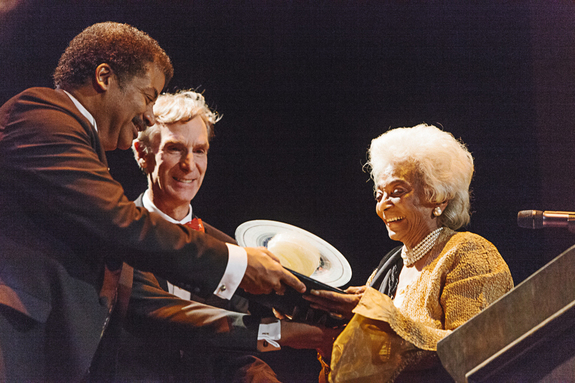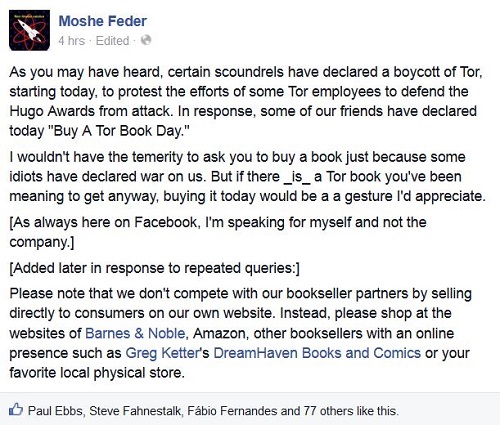(1) Steve Rzasa on Speculative Faith – “Puppies v. Trufans: Civil War”
My short story Turncoat, set in the Quantum Mortis sci-fi universe and written with a very specific aim, was nominated this way: Last spring, Vox Day approached me about writing a short story for the Riding the Red Horse anthology. He saw it as a successor to Jerry Pournelle’s There Will be War. Since I had a genuinely good time writing the Quantum Mortis books, I agreed. Over the next few months, I brainstormed concepts, and wrote Turncoat in July.
Fast forward to December 2014 and Turncoat was released as part of Riding the Red Horse. The first I learned of the Rabid Puppies thing was when I saw Turncoat on Vox’s slate or list or helpful suggestions round-up — whatever you want to call it — in February. I thought that was nice to be considered for such an award, and vaguely read over what Rabid Puppies’ aim was. Frankly, I didn’t think they had a snowball’s chance. But then again, I knew next to nothing about the Hugos and absolutely zero about the previous Sad Puppies efforts.
Whatever the goals of both Puppy groups are/were, they were not, from my perspective, pursued with Christian views in mind. The campaigning on both sides was, in one word, brutal. Even supposing the Puppy groups were correct that they were persecuted and disregarded when it came to science fiction awards, the whole fracas is in direct violation of Paul’s admonitions in Romans 12: “Bless those who persecute you; bless and do not curse them… Repay no one evil for evil, but give thought to do what is honorable in the sight of all. If possible, so far as it depends on you, live peaceably with all.”
The Puppy vs. Trufan war was not conducted in this fashion. There were some on both sides who conducted themselves well, but name-calling and threats dominated. I’m sure a lot of people outside the debate now think there’s a ton of crazy people reading sci-fi and fantasy.
But don’t kid yourself: this showdown was not about faith. It was about message.
(2) Sarah A. Hoyt on According To Hoyt – “Fauxtrage”
Mary Three Names, whom I don’t mean to impugn, because it’s becoming clear to me that she has an impairment that prevents her from understanding written language but has nonetheless managed to win three Hugos, leapt to a conclusion probably caused by her impairment and decided “Chicom” was a racial insult.
Now, I understand some of the younger people and those who didn’t grow up in Europe during the cold war might NOT know that Chicom is a contraction of Chinese and Communist. Not a racial slur under any way or form, but a way of specifying these were CHINESE communists, you know, not Russian Communists or Feminist Communists (you know, Mary, Femcoms, you might know some) or any other form of the repulsive ideology.
(3) True dat.
(4) Vox Day on Vox Popoli – “Directly over the target”
And wait, there’s more! The SJWs are also engaged in a charity drive so that John Scalzi will read it for the audio version.
As you can see, this is a masterful rhetorical response that totally proves the falsity of the Second Law of SJW: SJWs Always Double Down. One of my friends sent me an email last night that I think aptly describes the situation. “WTF, are you PAYING these people or something?” And just to ice the crazy cake, we’ve now officially gone meta as there are now fake fake reviews being posted. And while I’m not surprised by the nature of the reaction of the science fiction SJWs to the book, I am amazed by the vehemence behind it. They are absolutely furious to see that a book unmasking them was not only published by me, but is riding the very wave of media attention that they themselves created to success. That’s the importance of the parody in their minds; if it can become even more popular than SJWs Always Lie, that will disqualify it and render it harmless, thereby relieving the stress they are presently feeling.
(5) Dave Langford in a comment on Whatever at 1:39 a.m.
$50. I’m too deaf for audiobooks but will imagine this one in my head. WITH SOUND EFFECTS.
You rock Dave!
(6) Walt Boyes on Facebook
[This is a long post, as is the Burnside post that follows. All the excepts can do is suggest why I found them of interest.]
I am neither a Puppy nor a Puppy Kicker. But as a working editor, I am appalled that an award in which nearly all the professional categories requires the services of an editor to be a successful work, something like 2400 votes were cast in opposition to ALL the editor nominees. There were several worthy nominees who were beaten by NO AWARD, in my opinion, unfairly. One comment I have seen repeated several times was that if they were worthy, they’d have won. Maybe they’ll get nominated again sometime. That’s bullshit. They WERE worthy, and they got shat upon. All you have to do is to notice that Toni Weisskopf got four times the number of votes that the winner has in the last five years to see that. Mike Resnick had the same experience in the Best Editor-Short Form category…..
Revenge attempts won’t work, and in the long run, counter-revenge attempts like the slate voting of NO AWARD (Yes, it was a slate, and there is proof that is widely available). In fact, nothing will work. The Hugos are legally owned by the WSFS Trust, and they don’t want the rest of us.
They. Don’t. Want. Us.
I don’t think the Hugos can be saved. At least, I don’t think that the puppies movement will change things. WSFS owns the Hugos. Legally, to change the Hugo system you have to change WSFS. I don’t see that happening.
At Kansas City, amendments to the WSFS constitution will be proposed (please don’t ask me how I know) that will make it even harder to inject an outside nominee into the Hugos than the amendments passed in Spokane do. The Spokane amendments will almost certainly be ratified in Kansas City, as WSFS works to make it harder to “steal” their awards. The amendments made in Kansas City will be ratified in Helsinki, at what will may possibly be a very small Worldcon. Note how few people attended the WSFS business meeting in Spokane. And only people who attend the business meeting have the right to vote on the constitution. No Award will always win in a contest of wills. It isn’t right, but it is the way the rules are rigged. Remember, WSFS _owns_ the Hugo Awards outright. It IS their football.
What is going to happen, basically, is the WSFS Hugo Committee will be given the power to reject any ballot for “wrong think” of any kind. If the puppies campaign in 2016 has legs, WSFS will react by making their control tighter. They will create a “nominating committee” which will prepare a slate (I know, Irony, thy name is WSFS) of nominees for the ballot, from a “suggestion list.”
The SMOFs, the Nielsen-Haydens, and the other PuppyKickers have the numbers and the staying power to do this. The puppies, I am afraid, do not. In order to change this, and keep it from happening, the puppies will have to deliver 300-500 committed puppy voters to Kansas City and Helsinki, in person. $50 supporting memberships won’t help here. You have to have an attending membership, and then you have to show up for the business meetings. There were on the order of 300 people attending the WSFS business meetings in Spokane at some point in the proceedings. This year, the outsiders couldn’t deliver enough votes to take the Hugos. They certainly aren’t going to be able to deliver actual butts in chairs at two successive Worldcons.
The other thing that happened this year, and will happen again, is that the PuppyKickers controlled the media. This is not because of some gigantic left wing media conspiracy. That’s bullshit. Something like six companies, all led by conservatives, and 277 conservative executives control nearly all of the media outlets in the United States. If you don’t think so, look at how comparatively right wing CNN and MSNBC have gotten in the past six months. It’s because of the fact that Nielsen-Hayden and friends knew how to issue a freakin’ press release, and did so regularly. You can see the evidence for this in the fact that all the articles online and in print kept using the same phrases and sentences over and over. That’s because they got press releases, and used them as source material. To my knowledge, the puppies didn’t issue any. They waited for the media to come to them, and by the time they did, what passed for objectivity was the Wired article last weekend….
After the money, it is all about the culture war. There are people who believe honestly and strongly that women, minorities, and sexual issues are not being addressed to their satisfaction in science fiction and fantasy. They believe that there is too much white colonialism in science fiction. Folks, the way to change people’s minds is to understand where they are, be sympathetic to their position, and slowly move them to where you want them to be. It is way too late to do that. There is a crop of writers, mostly women, some women of color, and quite a few men, both white and non-, who are committed to changing what they see as bias toward white only culture.
This is not necessarily wrongthink. Nor is it necessarily the gods’ own truth. Stop telling these young writers they are wrong, or dismissing them as some sort of weird Marxists. Some of them are amazingly gifted writers. The ones that are, write brilliant stories where their bias against white colonialism culture really doesn’t show—it is about the story, and their bias isn’t the plot, and it certainly doesn’t affect the action….
One of the puppy kickers has regularly said, “Go start your own awards.” Despite the snark and the down-nose-looking deprecation, it really is good advice.
I fully expect to be run out of here on a rail for what I’ve said.
It is hard to be neutral in this thing. My sympathies lie with both sides, but my efforts lie in getting good writing, regardless of politics, and writing well myself. I got the trebuchet from David Gerrold after the awards, because I mildly pointed out that I didn’t support, “applause is okay, booing is not.” And I mean mildly. And Gerrold and I go back a ways. I am sure there are more people on the other side (Mike Glyer for one) who think I am an unmitigated Puppy asshole. I am not, and never have been, a Puppy.
Just a note: Walt Boyes has never been mentioned in a post on File 770 before, and only in two comments, neither of which expressed any opinion about him at all.
(7) Ken Burnside – “How the Hugos Crashed, aka: ‘The Diary of a Self-Deploying Human Sandbag In The Culture War”
I went to the INB Theater, sat in the front row and waited. The long discussion of the Official Hugo Asshole Disks led things off. The Sasquan chair reminded people that “No Award” was an option. David and Tananarive did a lovely job, and covered for a few gaffes from script pages not turning, and tried to keep it fun. I’ve been a master of ceremonies; I’m not going to rag on them for it.
Best Related Works came up. It went to No Award; I expected that. I didn’t expect the loud and raucous cheering, which, frankly, pissed me off.
Then Best Short Story came up. It also went to No Award. The cheering was even louder.
Then Best Editor, Short Form went to No Award and the cheering was deafening. There were several people who said “Fuck this…that’s not right…” when that happened, down in the nominee area. David heard it; he quickly looked over the orchestra pit to see what was going on.
Then Best Editor, Long Form went to No Award, and the cheering made the floor tremble. Several people (myself included) started booing. David said “booing is not appropriate” and I came about a half-second away from standing up and jumping on the stage to grab the mic. Bryan Thomas Schmidt DID get up and curse loudly. Toni Weisskopf apparently never went to the ceremony at all; per Bryan the two of them commiserated for a few hours after the ceremony.
Best Novelette went to an actual winner, best Novella got No Awarded (but with less cheering), and Best Novel got a Hugo. I made a point of personally congratulating all of the Hugo winners when I found them on Sunday.
Words cannot describe how furious I was at the outcome at the time. I sat in the theater after the lights came up. I had a brief conversation with political pundit (and fabricator of the Hugo Asshole Disks) Jim Wright. He agreed with why I was angry: Cheering for No Award (and cheering loudly) was beyond the bounds of acceptable behavior.
For a ceremony that promised to be about inclusion and “we’re all fandom,” having the master of ceremonies feed off the cheering for No Award? That’s very easy to take as hypocrisy of the first order. I’ve also been told, multiple times that SF readers are NOT FANDOM…and that’s part of the problem. Seeing “No Award” blow out candidates who were clearly meritorious, like Mike Resnick and Toni Weisskopf? With cheers that rattled the rafters and made the floor rumble?
I felt so very included in Fandom then. Really.
(8) Meg Frank discusses why she resigned as a Sasqan committee member in response to the handling of the Antonelli letter to the Spokane cops and what he wrote about Carrie Cuinn.
It is common knowledge at this point that Lou Antonelli wrote a letter to the Spokane PD. It is also known that he went on Sarah Hoyt’s podcast and bragged about it. While many were rightly focused on David Gerrold’s reaction, the simple fact is that he wasn’t the only person harassed and intimidated, and he wasn’t the only one to report it. As the Co-Director of the Hugo Ceremony I reported my fear directly to my superiors. I did so several times – initially rather timidly because I didn’t want to make a fuss, but later rather firmly in a way that could not be misunderstood. One of the vice-chairs, Glenn Glazer, attempted to guilt me into not pursuing the complaint, and one of the Operations Division Heads, Robbie Bourget told me flat out that I hadn’t been harassed. When I pointed this out to them, I was told that I hadn’t ever made an official harassment complaint and lots of sarcasm that wasn’t in any way close to appropriate.
Senior members of the Sasquan committee responded to a member reporting harassment and asking for help with guilt trips, denial, victim blaming, sarcasm and dismissal.
In the interest of avoiding a he said/she said situation, I have PDFd all of the emails in this conversation and placed them in a Google Drive folder here:
https://drive.google.com/open?id=0B-XkKq2NGWUZV21ubUpYOVhtOHM
[Frank has since created an alternate address because people said they could see all the emails — https://drive.google.com/folderview?id=0B-XkKq2NGWUZfkEzMlNwMGl3amVndzZ1MmxmakhHUHpEdzJRNG1BOVNRYlBJZEZsd1dPT00&usp=drive_web.]
After a fair bit of crying, some time spent on the phone with Jill, and lunch with a good friend, I decided to resign. I cannot ever in good conscience support a committee that treats its members this way. Any member, including committee members and staff, should feel able to report violations of the code of conduct and be taken seriously.
(9) Cat Valente sets the record straight in a comment on File 770:
I can knock this one down:
>I saw George R.R. Martin declare that all Puppies were Rabid at his party, and hoped that his alternate awards would’t be needed in the future, and more or less cheered for fandom holding off the barbarians. You know, people like me.
I was at the party, and as usual there is a tiny bit of truth in the wreckage of honesty on display.
George did indeed talk at length in the lead up to his announcing the Alfies. Most of it was on the history of the Hugo rocket as a hood ornament and the early days of the Hugo Losers Party that, you know, he invented. When it came time to say something about why he went and dug up old hood ornaments to make awards out of, he did say that he hoped the awards would be the first and last Alfies given out–because he hoped that next year would be a normal Hugos with a fair ballot. He absolutely did not say “all Puppies are Rabid” or anything of the kind. And he did not “more or less” praise fandom for holding off barbarians. You can tell by the “more or less” that this part is complete bullshit.
George Martin has advocated against No Award since day one of this mess. He was sad and hurt and astonished by the vitriol like we all have been, but he in no way presented the No Award result as a victory, (why would he, since he didn’t want No Award to take the night) nor the Alfies as the “real award” in any way. Rather, he emphasized that this was all his opinion and his party and his decision, his “grand and futile gesture.” His exact words were: “And yes, there are committee awards, but I am the committee.”
(10) This sounds terrifying.
(11) Gary K. Wolfe in the Chicago Tribune – “Hugo Awards: Rabid Puppies defeat reflects growing diversity in science fiction”
Following the official awards ceremony, Martin hosted a huge party in a landmark mansion, during which he presented his own “Alfie Awards,” named after science fiction writer Alfred Bester, to several candidates who, according to the final vote tallies, would have been on the Hugo ballot but were bumped by the Puppy slates. The Alfies, made from actual old automobile hood ornaments (which earlier Hugo trophies were said to resemble), also went to Puppy-slate authors who had withdrawn their own nominations, giving up a chance at a Hugo rather than being associated with the Puppies and with slate voting, and to Eric Flint, a novelist who — although he is popular among many Puppies — had posted insightful critical commentary on the controversy during the summer.
Martin clearly viewed the Hugo results as a dramatic victory for fandom and for the science fiction community at large, and made the point, shared by many in the aftermath of the awards ceremony, that in the end the controversy—inevitably dubbed “Puppygate” — represented not a divided science fiction community, but rather a surprisingly united one, and one which chooses to celebrate diversity rather than to view it as a conspiratorial threat. The Puppies themselves — some of whom have since claimed victory simply by forcing the “no awards” votes — may or may not return next year, when Worldcon is in Kansas City. But some estimates have them at no more than 10 percent to 20 percent of this year’s voting, and since the huge membership of the Spokane Worldcon — over 11,000, including non-attending members — provides an enormous base for next year’s nominations, it likely will be more of an uphill battle against a broader community that has already rejected them once and that will not as easily again be taken by surprise.
The final irony in all this is that the Hugo Awards, while more diverse and international in recent years, have never really disdained the kind of adventure fiction that the Puppies claim to champion. I met the winning novelist, Cixin Liu, when he was in Chicago earlier this year, and he made it clear that his idols are classic writers like Robert A. Heinlein and Isaac Asimov. “The Three-Body Problem” itself concerns communications with an alien race, the Trisolarans, whose plan is to invade the Earth as a refuge for their own endangered civilization — surely one of the oldest plots in science fiction. John Scalzi, who became one of the chief targets of Puppy vituperation, is a white male who won the Hugo in 2013 for “Redshirts,” a space opera adventure with knowing references to “Star Trek.” Among the novellas bumped off the ballot this year by the Puppy slate was Nancy Kress’ “Yesterday’s Kin,” a well-written tale that begins with an alien spaceship parking itself over New York harbor.
The problem, I suspect, is that none of these works are only about revisiting these favored old tropes. Sometimes they satirize them (as with Scalzi). Sometimes they introduce political themes (as with Cixin Liu, whose novel opens with a harrowing account of China’s Cultural Revolution). Sometimes they focus on character and family relationships (as with Kress). What seems to threaten the Puppies is not that science fiction has forsaken its origins (which it clearly hasn’t), but that readers have come to expect more and to welcome different voices. The old-fashioned modes of space adventure and military science fiction still have substantial markets, but it’s probably true that such works show up less on Hugo or Nebula award ballots than their supporters would like.
(12) Olivia Geng on the Wall Street Journal – “Cixin Liu Becomes First Asian to Win Hugo Award for Science Fiction”
Chinese author Cixin Liu last weekend became the first Asian to win the Hugo Award for best science fiction or fantasy novel. Yet to hear the Shaanxi native tell it, making history pales in comparison to the importance of ensuring science fiction’s future in China.
“I don’t really have any special feeling about it,” Mr. Liu said by phone from his hometown in Yangquan, Shaanxi province, when asked about becoming the first Asian to win the prize in its 62-year history.
“The Hugo Awards are not well-known in China,” he added. “It still cannot change the recent receding popularity of science fiction in China. All I can do is try my best and write as many good sci-fi works as I can.”
(13) R. S. Benedict on Unicorn Booty – “Sorry, Sad Puppies: Science Fictuion Has Always Been Political”
If Mary Shelley was science fiction’s mother, its father was probably H. G. Wells. His many works have been imitated, copied and adapted over and over again. Were H. G. Wells alive today, the Sad Puppies would probably despise him. He was a socialist who believed in racial diversity — a very controversial view in the 19th century.
But, the Sad Puppies might argue, as long as he kept his politics out of his writing, it wouldn’t be a problem. The problem with sci-fi writers is that they insist in letting their politics shape their stories.
Bad news, guys: H. G. Wells’s works were all about politics.
The War of the Worlds was Wells’s reaction to Western imperialism. Unlike many of his countrymen, he believed that Great Britain did not have a God-given right to invade and conquer other nations in Africa and the Pacific. The War of the Worlds was his way of saying to England, “How would you like it if someone did that to you?” He explicitly spells out his point in the novel: ….
(14) Aya de Leon – “The Hugo Awards, Social Justice, and the Psychoanalytics of Genre”
In many ways, the Hugo battle has been inevitable. It’s been coming since the US ended the era of legal racial segregation and began to question strict gender roles. In the latter case, young women have historically been pressured to read materials that reinforced their domestic roles. They weren’t supposed to be concerned with what happened outside their door in this world, let alone be concerned about what was happening in other worlds. But in the 70s and 80s, women SFF writers have developed a strong body of work in the genre and beyond, exploring issues of gender and developing wide readership.
For people of color, prior to integration, SFF was for white people. However, in the 70s and 80s, an early vanguard of black SFF writers began to integrate the genre. During that time, a relatively small number of people of color would read SFF (sometimes—prior to the internet—they were completely unaware of the POC who were writing it). The readership was primarily those of us with white friends, at white schools, or in white communities. Not surprising that SFF themes of alienation or actual aliens spoke to many of us.
(15) jaythenerdkid on The Rainbow Hub – “The Hugo Awards Controversy and Sci-Fi’s Diversity Problem”
The Sad Puppy vision for the Hugo Awards is one where nominations are a meritocracy (where people who write innovatively about gender, sexuality, race and other social issues are considered without merit). The Sad Puppy method of achieving this vision involves harassing everyone who doesn’t agree with them, because their arguments can’t actually stand on merit. They’ve even run afoul of George R. R. Martin, who is about as establishment as it gets in contemporary fantasy (I mean, one of his heroines is a literal white saviour in a land full of brown savages, yikes!), which means they’re now very much persona non grata in the SF/F community, something they’ve decided is a badge of honour rather than a damning condemnation of their beliefs and tactics.
That’s all well and good, but the fact that the Puppies got as far as they did – completely rigging five categories so that the only nominees were of their choosing, and skewing several others so there were very few choices who weren’t theirs – says a lot about a community that’s always inhabited a curious place halfway between insular and inviting, inflexible and innovative. It’s strange to think that the Hugo Awards, which have honoured legends like Ursula K. LeGuin and Octavia Butler, were turned into a farcical man-child temper tantrum by a bunch of jilted former nominees who wanted to ruin everyone else’s fun. At the same time, it makes perfect sense coming from a community that can accept the War of the Roses with dragons, but not making a fictional god female. There’s always been this element in the fandom of people – mostly men, mostly cis, mostly straight, mostly white, mostly middle-class, mostly college-educated – who think escapism and adventure stop being fun once politics that don’t agree with their own are introduced. (They’re fine, of course, with the hard-right libertarian politics of works like Ender’s Game or the oeuvre of Terry Goodkind.) The internet has enabled these squeaky wheels, giving them wider platforms and the ability to organise their bullying and harassment.
(16) Joe Vasicek on One Thousand and One Parsecs – “The Decline and Fall of Fandom and the Hugo Awards”
Can the Hugo Awards be saved? I seriously doubt it. The “truefans” will jealously clutch it to their chests until they die, and with the graying of fandom, that will probably be accomplished fairly soon. But just as the Renaissance rose from the long-cold ashes of the Roman Empire, so too I hope that something good will eventually come out of all of this. Because really, there is a place in fandom (lower-case f) for everyone, and that has never changed.
(17) Creative Bloq – “Hugo Award-winning artist reveals her secrets to success”
Here, Elizabeth reveals her top tips for fantasy and sci-fi artists who want to get noticed…
01. Community
Search out art communities, locally and web-based. We are a reasonably small set of artists in the grand scheme of things and it becomes really easy to see all of the connections and overlaps.
Personally, I highly recommend ArtOrder. Jon Schindehette is a huge advocate for artists in general and ArtOrder is his baby.
02. Professionality
Be professional. Always, always, always make deadline. READ YOUR CONTRACTS.
03. Exceed Expectations
Strive to make your art director look awesome through giving them great work. One of the bits of advice I follow is do not create illustration you feel simply reflects your payment.
Always try to exceed their expectations. It may only be a $100 contract, but your work should look like you were paid $500. The internet is forever. Your work is you.
(18) Natalie Luhrs on Pretty Terrible – “No More Memory Holes”
So remember how Sasquan decided that even though Lou Antonelli violated their Code of Conduct they weren’t going to enforce the Code of Conduct because David Gerrold didn’t want them to? Turns out that Gerrold wasn’t the only one feeling harassed and intimidated–and he wasn’t the only one to report it.
Meg Frank, the Events Deputy Division Head also reported same against Lou Antonelli and was told by the head of operations, Robbie Bourget, that she had not been harassed and one of the vice-chairs, Glenn Glazer, attempted to guilt her into backing down. Instead of backing down, Meg Frank resigned a week before the convention. Frank has provided a PDF of emails to back up her assertions.
I wish I could say I was surprised, but I’m not. Here are a some screencaps from the Journeymen of Fandom group on Facebook in which it is clear that Robbie Bourget sees the rehabilitation of offenders back into community as a higher priority than attendee safety….
(19) Juliette Wade on TalkToYoUniverse – “My new SF/F Reading Journal for next year’s Hugos”
I have been inspired by this year’s Hugos.
It’s become clear to me, as perhaps it has to many others, that entrusting my opinions of the latest genre works to others to nominate for awards is not enough any more.
One might ask: why haven’t I done the active, thorough job I wanted on nominating? Easy: life. The biggest factor in my failure is my faulty, distracted, non-eidetic memory.
Therefore, I’m starting a reading journal.
Essentially, I am a very busy person (as many are), and I can’t always call to mind every story I’ve read in a year, even the good ones. From now on, every time I read a story in the field, or a brilliant article, etc. I’ll be writing down title, author, and publication
(20) Cat Rambo on The World Remains Mysterious – “My Report from Sasquan: Mostly Glorious and So Many Thank Yous”
Met up with Mike Resnick, who has appeared on the Hugo ballot a breathtaking 37 times, winning 5, after the panel. We ventured out into the hazy afternoon along the riverwalk to talk about some SFWA stuff and came out of that excited about some prospects. I’m a longtime fan of Mike’s, not just of his excellent work, but of the way he helps newer writers, consistently extending a hand by collaborating with or publishing them. As SFWA President, I’m trying to make sure that the org’s moving forward in a way that makes (almost) everyone happy, so I wanted to talk about how we could use some of SFWA’s new marketing resources to help with the committee that Mike has ably headed for so long, the Anthology Committee. I’m looking forward to working with him on the SFWA projects we discussed.
[Thanks to Mark Dennehy, Ann Somerville, and John King Tarpinian for some of these links.]








